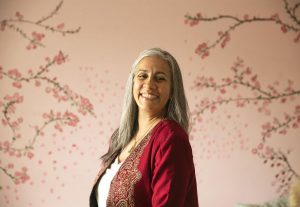Coalition hopes to teach Brisben Center residents healthy cooking and eating skills
FREE LANCE-STAR | by ADELE UPHAUS-CONNER
For upwards of four years, Christian Zammas and his family were homeless, living in hotels across the country.
Zammas, who owns Katora Coffee in downtown Fredericksburg, is a professional chef and cooked in restaurants in St. Louis, Fort Lauderdale, Fla., Manhattan and Raleigh, N.C.
But in the hotel rooms where he, his wife and two sons lived, there were no full kitchens, so preparing nutritious meals for his family was difficult or even impossible.
“I’m at work and here’s my wife faced with two hungry children and herself,” Zammas said. “How easy it is to reach for a ramen or go to the dollar menu at McDonalds?”
Even years removed from that situation, Zammas said, his older son still struggles with a very limited palate and has difficulty making healthy food choices because of the routine of relying on processed, fast food.
“If I, as a professional chef, had such a hard time, I can only imagine how impossible it is for people in that situation without those skills,” he said.
That’s why Zammas, who lived at the Brisben Center for a time and credits the shelter with helping him get back on his feet, was eager to participate in a new nutrition coalition that center director David Cooper wanted to organize.
“We see hundreds of homeless people in and out of the shelter that are nutritionally challenged,” Cooper said. “We want to improve their eating habits, which will improve their quality of life.”
According to the National Health Care for the Homeless Council, foods provided to homeless families by shelters are, on average, high in fat, low in fiber and lacking in important nutrients.
A study conducted by the council found that preschool children who are shelter-fed receive only 66 percent of the recommended amount of bread and grains, 25-33 percent of the recommended amount of vegetables and the minimal recommended amount of meat and fruit allowances per day.
And homeless families living in hotels have an even worse nutritional profile. On an average day, 32 percent of the participants in a nationwide survey had no dairy products, 36 percent had no vegetables and 77 percent did not consume fruit.
Such nutrition deficiency can lead to long-term health problems such as heart failure, obesity, diabetes, depression and anxiety.
The Brisben Center’s nutrition coalition was formed in August and in November, the group’s planning committee—made up of Zammas, Dr. Yum Project board member Laura Visioni and Virginia Cooperative Extension agent April Payne—presented their idea for a series of evening workshops for families residing at the center.
The goal is to teach the families cooking and meal-planning skills they can take with them when they leave the shelter.
Based on the assumption that families might not have access to a full kitchen once they leave, the classes will demonstrate how healthy meals can be made on a hot plate, in a crock pot or other implements that simply plug into a wall.
“We want them to leave with skills they can use anywhere they go,” Zammas said.
The classes—which would be taught by volunteers “with a combination of emotion and heart and skill,” Visioni said—will focus on basic formulas for healthy meals, rather than specific recipes.
“We don’t want people to be relying on recipes,” Visioni said. “So we’d teach them how to make a generic soup or a generic smoothie or yum bowl to which they can add whatever ingredients they have on hand.”
Some of the class ideas the committee proposed include blender cooking (smoothies and purees), crock pot cooking, “no cook” cooking (salads and healthy no-bake treats) and microwave cooking.
Each topic would be taught along with a course on nutrition basics and food safety.
To begin, the classes will be limited to families instead of single residents of the shelter.
“We want to get to and include the children, so there’s that buy-in and they get excited about cooking food at home,” Zammas said.
The committee members surveyed residents of the shelter at dinner one night to assess their level of interest in different cooking and nutrition-related topics. They found that people most wanted to know how to use the fresh and sometimes unfamiliar ingredients they might get for free from local farms, how to store and use leftovers, how to prepare healthy meals with the tools and equipment they have and where their food comes from.
“We feel there is a desire to participate,” Zammas said. “We want people to want this. And we think we have that feeling.”
The coalition, which also includes Brisben Center staff, representatives from The Table at St. George’s Episcopal Church and the National Health Care for the Homeless Council, and registered dietitian Leah Courtnage, hopes to start offering the nutrition classes in March.
It is seeking volunteers to help plan and teach the classes.
Cooper said he has also spoken with Mary Washington Hospital, the American Heart Association, the Moss Free Clinic and both the local and national levels of Kaiser Permanente about participating in the coalition.
“I think this is really going to gain traction,” he said.

